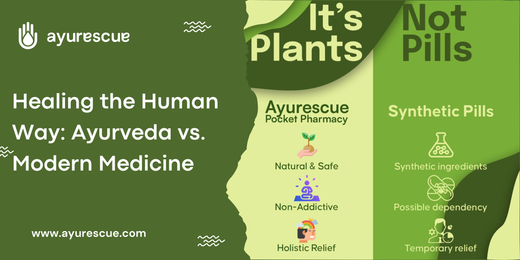
Healing the Human Way: Ayurveda vs. Modern Medicine
Introduction
Healthcare is an essential aspect of human well-being, but choosing the right approach to treatment remains a debate. Ayurveda, an ancient healing system, and Modern Medicine, backed by science and technology, offer two distinct methodologies. This article delves into their principles, effectiveness, safety, and future to help individuals make informed healthcare decisions.
Historical Background
Origin of Ayurveda
Ayurveda, a 5,000-year-old system originating from India, focuses on balance within the body using natural elements. Ancient texts like Charaka Samhita and Sushruta Samhita describe detailed medical treatments, surgical procedures, and holistic wellness practices. Ayurveda is based on the principles of the Pancha Mahabhuta (Five Great Elements)—earth, water, fire, air, and space—which govern bodily functions and health.
Evolution of Modern Medicine
Modern Medicine emerged from ancient Greek, Roman, and Egyptian medical practices. The 19th and 20th centuries saw breakthroughs in antibiotics, vaccines, and surgeries, making it the dominant medical system worldwide. The Germ Theory of Disease, developed by Louis Pasteur and Robert Koch, played a pivotal role in shaping modern medical advancements.
Core Principles
Holistic Approach in Ayurveda
Ayurveda follows a mind-body-spirit approach, emphasizing balance in the three doshas (Vata, Pitta, Kapha). It promotes self-healing through diet, yoga, meditation, and herbal medicine. According to Ayurveda, imbalances in these doshas lead to diseases, and restoring balance results in health and longevity.
Evidence-Based Approach in Modern Medicine
Modern Medicine relies on clinical research, diagnostics, and technological interventions to treat diseases effectively. It follows an empirical, scientifically validated methodology. The Biomedical Model is the foundation of modern medical practice, emphasizing pathophysiology and molecular biology to understand disease mechanisms.
Treatment Methods
Herbal Remedies in Ayurveda
Ayurvedic treatments use natural herbs, oils, and minerals to restore balance. Popular remedies include Ashwagandha (for stress relief), Turmeric (anti-inflammatory), and Triphala (digestive health). Ayurveda classifies treatments based on the individual's prakriti (constitution) and disease type.
Pharmaceuticals and Surgeries in Modern Medicine
Modern Medicine provides prescription drugs, vaccines, and surgeries to address conditions with precision. It excels in organ transplants, cancer treatments, and emergency care. The introduction of biotechnology and gene therapy has further revolutionized modern medical treatments.
Preventive Healthcare
Ayurveda’s Lifestyle Practices
Ayurveda emphasizes daily regimens (Dinacharya), seasonal routines (Ritucharya), and detoxification therapies like Panchakarma to prevent diseases. Ayurvedic philosophy suggests that proper food, sleep, and stress management are the pillars of good health.
Modern Preventive Medicine
Modern Medicine focuses on vaccinations, early screenings, and lifestyle modifications like exercise, balanced diet, and stress management. It uses advanced tools like genetic screening and AI-driven diagnostics to predict and prevent diseases.
Integration of Ayurveda and Modern Medicine
The growing field of Integrative Medicine aims to combine the best aspects of Ayurveda and Modern Medicine. Hospitals and healthcare institutions are increasingly incorporating Ayurvedic therapies like meditation, herbal treatments, and detox programs alongside modern treatments for holistic well-being.
Future of Healthcare
Advancements in Ayurveda
Recent research on nanotechnology in Ayurveda (Bhasma preparations) and herbal pharmacology is increasing Ayurveda’s credibility. AI-driven analysis of Ayurvedic texts is also aiding in the development of personalized treatments.
Innovations in Modern Medicine
New developments in AI, biotechnology, and precision medicine are shaping the future of Modern Medicine. CRISPR gene editing, nanomedicine, and regenerative medicine are expected to revolutionize healthcare in the coming decades.
FAQs
1. Is Ayurveda scientifically proven?
Some Ayurvedic treatments have been validated through modern scientific research, but more large-scale clinical trials are needed to establish widespread acceptance.
2. Can Ayurveda and Modern Medicine be used together?
Yes, many people integrate both systems for a balanced approach, but it’s important to consult a healthcare professional before combining treatments.
3. Are Ayurvedic medicines safe?
When used correctly and under the guidance of an experienced practitioner, Ayurvedic medicines are generally safe. However, improper formulations or self-medication can lead to adverse effects.
4. How does Ayurveda treat chronic diseases?
Ayurveda focuses on addressing the root cause of chronic diseases through diet, herbal remedies, detoxification, and lifestyle modifications.
5. Is Modern Medicine more effective than Ayurveda?
Modern Medicine excels in emergency care and advanced treatments, while Ayurveda is beneficial for preventive care and chronic disease management. The effectiveness depends on the condition being treated.
6. How long does Ayurvedic treatment take?
Ayurvedic treatments are generally slow acting as they aim to restore balance gradually, unlike Modern Medicine, which often provides faster relief.
Choosing between Ayurveda and Modern Medicine depends on individual health needs, accessibility, and preferences. A combined approach may offer the best results, allowing individuals to benefit from natural healing and scientific advancements.


